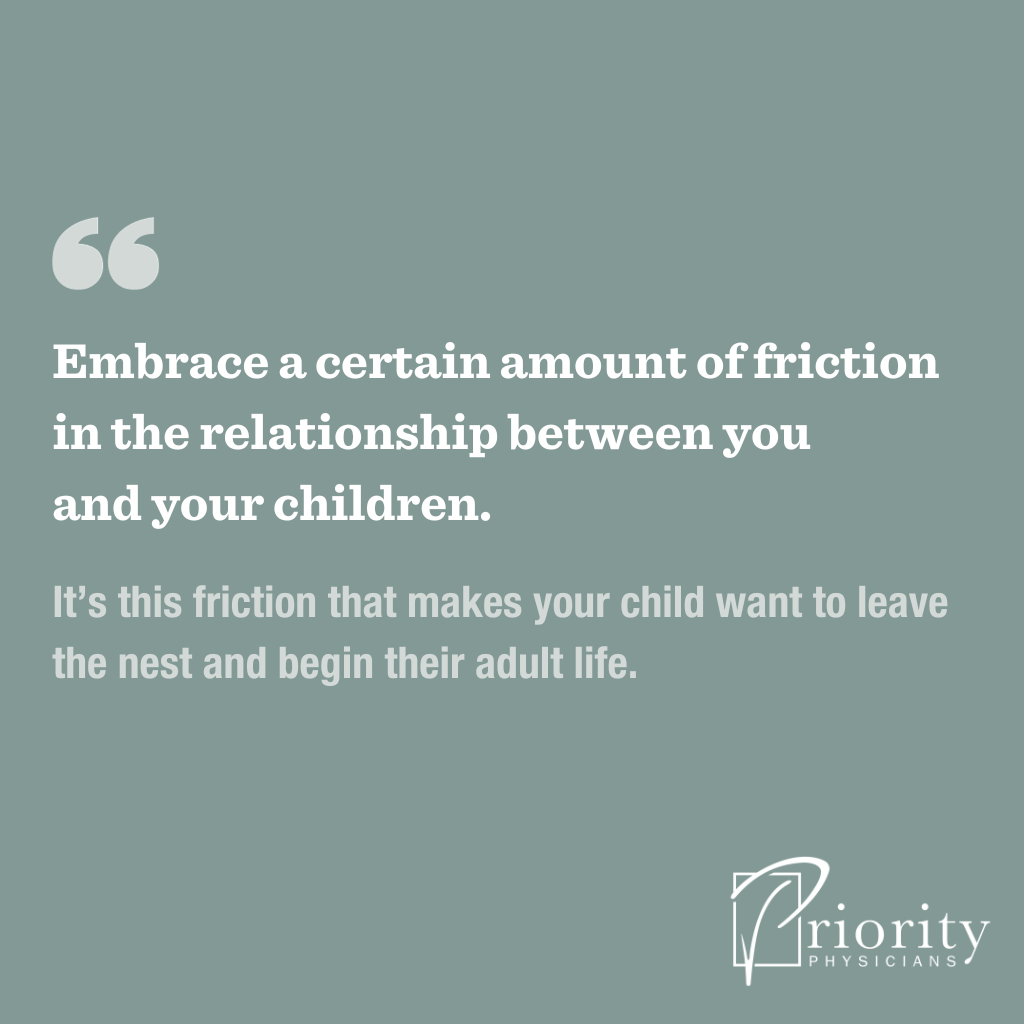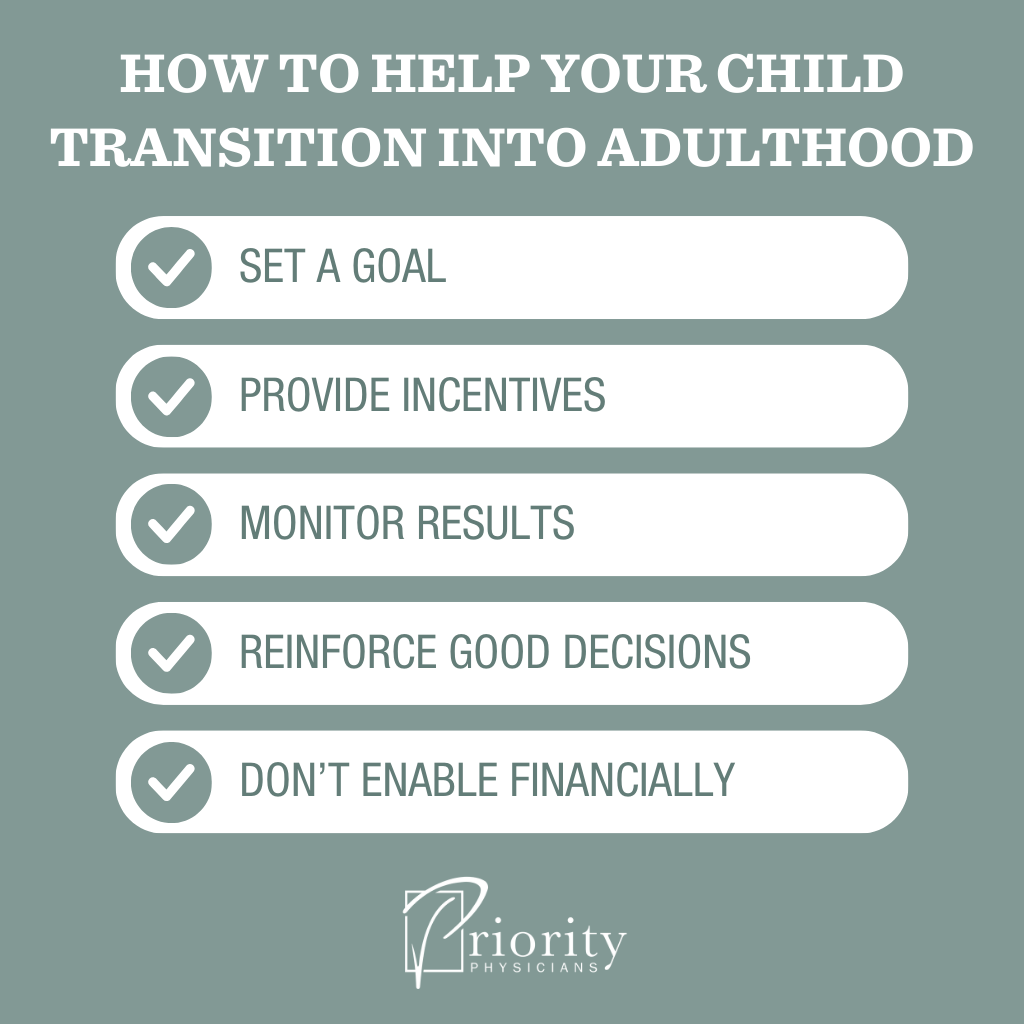Relationship-building is my favorite part of my job.
As a direct primary care physician, I can spend a lot of time with my patients. The more we talk, the deeper our connection becomes, giving me a more holistic view of the patient’s life beyond healthcare, including work, home, and family.
This means I often gain insight into stressors or concerns impacting a patient’s life. I appreciate these insights. The more I understand my patients, the better I can help them manage issues that ultimately affect their health.
A frequent topic in our deeper chats is parenting challenges, which include not only raising younger kids but coping with older ones as well. (If your 20-something has become a permanent fixture on your couch, you may identify.)
Regardless of your child’s age, I suggest approaching your relationship with them the same way you’d approach a health goal: Prevent issues before they arise, and encourage progress.
Parenting Never Stops
When your child is very young, you applaud the small successes that make them increasingly self-sufficient — the first time they display bathroom skills, feed themselves, or practice basic hygiene.
But parenting never stops. As your child grows, you shift from The Caregiver — laser-focused on their daily well-being — to a role that’s less hands-on but just as concerned with their long-term well-being: The Example.
Kids of all ages, from toddlers to young adults, are observant. They watch how you live your life — so be “The Example” for how they should live theirs.
Around the time your child moves into their mid-teens, they may face their first real, life-changing decision. It’s a good sign if they want to come talk to you about it. That’s when you assume a new role: The Consultant.
Providing advice and guidance in this phase is great, but it’s also important to avoid having your older child depend on you for all the answers.
Further, you can embrace a certain amount of friction in the relationship by ensuring you’re not enabling them or making things too easy for them. It’s this friction that makes your child want to leave the nest and begin their adult life.

What to Do About ‘Failure to Launch’
Do you have a child in their 20s who resists moving into adulthood? Try the same approach I take with health-related issues:
Set a Goal
Diagnose why your adult child may lack direction. Don’t just focus on what you want for them; understand what they want.
When you uncover what’s really going on, helping them set goals becomes much easier.
Provide Incentives
Encouraging patients is usually pretty straightforward for a physician. Parenting is different. Older kids need to move through a few rough patches in order to grow.
As a parent, it’s okay for you to help guide them to the other side. Be sure to remind them of the bigger picture and what it’s worth — and as they grow, acknowledge and reward their progress.
Monitor Results
We physicians continually monitor each patient’s status, review results, seek feedback, and pivot to a new plan if progress isn’t optimal. Parenting adult kids works much the same way.
You might have the “best plan” in the world for your older child’s future, but your adult child is a unique individual. A plan that doesn’t align with their personality and aspirations won’t work.
The two of you can’t expect to sit down once, hammer out what your child is going to do, and just do it. You’ll need to touch base with your young adult to ensure they’re on plan. If they’re not accomplishing their goals, you may both need to shift the approach.
Reinforce Good Decisions
Helping your adult child make progress isn’t entirely based on discipline. As a physician, I applaud my patients’ health achievements. You can celebrate your young adult’s successes the same way.
Kids, even older ones, often look for attention or positive reinforcement from their parents. Recognize even small efforts that reinforce the behaviors and outcomes your child is working toward. Call out progress, emphasize it, and reward it.
Don’t Enable Them Financially
As a physician, I’m careful not to enable harmful behavior. For example, I’m not going to prescribe weight loss drugs for someone with an eating disorder or blood pressure medication for someone prone to passing out.
As a parent, you too need to be careful about encouraging the wrong behaviors. Offering too much financial help is a prime example. It may be gratifying to help kids through their monetary struggles, but young adults need their own jobs and incomes to be productive members of society. They must develop financial savvy as they work toward independence.
Don’t wait until your kid is 30 years old before letting them sink or swim financially. Ideally, you can begin by encouraging fiscal responsibility at the candy store when they’re young, not years later when they’re trying to purchase a house that’s beyond their means.

Let’s Talk
Your Priority Physicians team is here to have deep conversations with you and your family, including discussions that extend beyond healthcare.
We love building relationships. The more we understand your daily life, wishes, and concerns, the better we can help you map a path toward your family’s best health.

